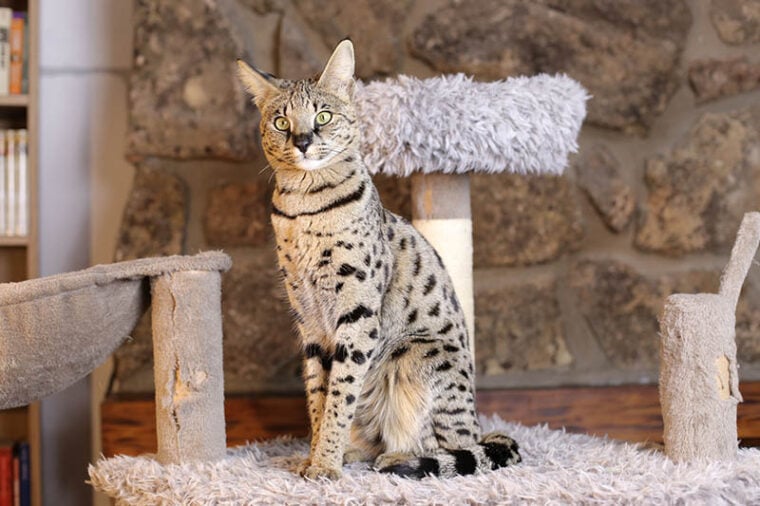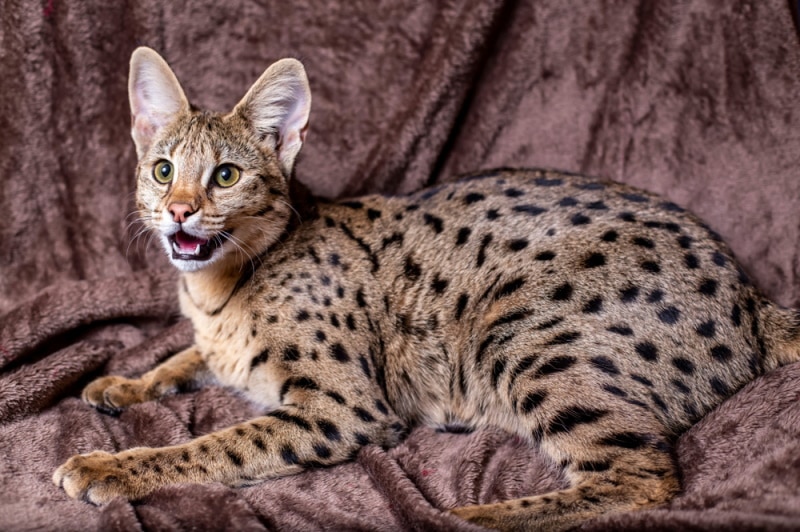
Almost 70% of American households have pets. However, to enjoy their immense benefits, some people must deal with allergies caused by pet fur and saliva. Allergies caused by dogs and cats affect between 10% and 20% of the population.
The Savannah Cat is a breed often touted as being hypoallergenic. Unfortunately, all cats, including the Savannah, are not truly hypoallergenic. While a Savannah may cause fewer allergic reactions than many other breeds, they still shed allergens that can negatively affect people with allergies. Read on below to find out more.
What Does Hypoallergenic Mean?
The term “hypoallergenic” was coined in 1953 by cosmetic product marketers to imply products that did not cause allergic reactions. Today, the term hypoallergenic is often used to describe pets that do not produce allergens.
However, the word “hypoallergenic” is often thrown around when describing certain cat breeds and should not be completely trusted. This is because all cats produce allergens to some degree, albeit in differing quantities.
How Does a Savannah Cat Cause Allergies?
Savannah cats are not hypoallergenic, although they are known to produce fewer allergens than many other cat breeds. All cats produce Fel d 1, a protein that causes allergic reactions. Fel d 1 is largely produced in the saliva, urine, and sebaceous glands. As the cat grooms itself, it transfers the protein onto the fur and dander. Dander is dead skin or any material shed by animals with fur, hair, or feathers.
Because dander is light and stays airborne for a very long time, it is the most prevalent carrier of Fel d 1 proteins. Once in the air, the protein will reach the nasal cavity and skin, causing a reaction.
Besides breathing in, other ways the protein reaches the body is when you come into contact with shed fur.

Signs of Savannah Cat Allergies
Common signs of cat allergies are:
How Do You Prevent Allergic Reactions to Cat Dander?
Cleaning and grooming your cat regularly helps remove loose fur from its coat. This prevents Fel d 1 from being transferred onto human skin. To clean your cat, use pet wipes or a damp towel and a bowl full of water mixed with pet-friendly shampoo. However, if you have serious allergies, you may want to use a professional pet groomer to avoid any reactions.
It’s also important to have certain areas of your home that are off-limits to your cat. This could be your bedroom or bathroom and provides a space where there will be no allergens left by your feline. Of course, make sure to regularly wash all bedding, blankets, and surfaces that your cat has been in contact with.
One study showed chicken eggs containing Ig Y immunoglobulins specific for Fel d 1 antigen have an agent that neutralizes the protein. The antigen is found in egg yolk and binds to three sites on Fel d 1 proteins, reducing its negative effects on the body. The study further explains that almost 86% of cats that were fed with eggs had a reduced level of protein. Out of that 86%, the protein level was reduced by more than half in 30% of the cats.
Allergy medications are available as pills, sprays, and shots. Each person’s choice depends on how effective the medications are. Antihistamines block histamine, a chemical the immune system releases during an allergic reaction. Nasal sprays such as Azelastine contain antihistamines to relieve patients from chest congestion.
Decongestants provide short-term relief to a congested chest. They can be nasal sprays, pills, or powders to dissolve in warm water.
Does the Savannah Cat Fewer Allergens?
Yes, the Savannah cat produces fewer allergens because it sheds less hair, and the unique combination of genes reduces the level of Fel d1 proteins in the saliva. This is great news for allergy sufferers, but these long-lived cats are still not 100% hypoallergenic and you may still suffer from some allergic reactions.
Summary
Savanna cats are not hypoallergenic. Like all cats, they produce a protein known as Fel d 1, which causes allergic reactions. However, they produce less of this allergen than many other cat breeds, so may be an option if you are an allergy sufferer looking to own a cat with minimal chance of reactions.
Featured Image Credit: AJR_photo, Shutterstock






